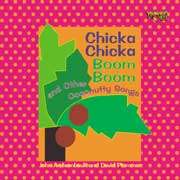Chicka Chicka Boom Boom
| Author | Bill Martin, Jr., John Archambault |
|---|---|
| Illustrator | Lois Ehlert |
| Cover artist | Lois Ehlert |
| Country | United States |
| Language | English |
| Subject | the alphabet |
| Genre | Children's picture book |
| Publisher | Simon & Schuster |
Publication date | 1989 |
| Pages | 36 |
| ISBN | 1-55924-577-8 |
| OCLC | 19262991 |
| Followed by | Chicka, Chicka, 1, 2, 3 |
Chicka Chicka Boom Boom is a bestselling American children's book written by Bill Martin, Jr. and John Archambault, illustrated by Lois Ehlert,[1] and published by Simon & Schuster in 1989. The book features anthropomorphized letters.
Summary
The 26 lower-case letters climb up a coconut tree in alphabetical order, until the tree bends so much, causing all 26 letters to fall out of the tree. The uppercase letters (the older relatives of the letters climbing the tree) come to help them. Again alphabetically, it describes each letter's injury, including:
- "D" having skinned-knee
- "E" having a stubbed toe
- "F" becoming patched up
- "G" all out of breath
- "H" and "I" getting tangled together
- "J" and "K" about to cry
- "L" being knotted like a tie
- "M" being looped
- "N" being stooped
- "O" being twisted; alley-oop
- "P" having a black eye
- "T" having a loose tooth
- "U", "V" and "W" wiggle-jiggling free
At sunset, the letters "X", "Y" and "Z" are the "last to come" from the coconut tree. Later at night, the letter "A" gets up and climbs back up the coconut tree, dare(-)double(-)daring the other letters to catch him.
The book is notable for its rhyming structure which is reminiscent of the jazz vocal improvisation technique known as scat singing.
An audio book version is also available, narrated by Ray Charles.
A CD-ROM version was released in 1995 by Davidson and Simon & Schuster Interactive.
It inspired a 2004 sequel, Chicka, Chicka, 1, 2, 3. A board book for toddlers, entitled Chicka, Chicka ABC was published in 1990 and contains the first half of the full story, which ends up with all 26 letters falling out of the tree.
Recognition
- Best Books[2]
- Children's Choices, 1990; International Reading Association; United States
- Children's Catalog, Eighteenth Edition, 2001; H.W. Wilson; United States
- Teachers' Top 100 Books for Children; National Education Association (based on 2007 online poll); United States[3]
- Top 100 Picture Books; School Library Journal (based on 2012 poll); United States[4]
- Awards, Honors, Prizes[2]
- Kentucky Bluegrass Award Winner 1991 Grades K-3 Kentucky
- Parents' Choice Award (Gold 2003, Best 25 Books in 25 Years United States)
Antecedents
John Newbery's 1744 "A Little Pretty Pocket-Book" might have influenced Bill Martin's text for "Chicka Chicka Boom Boom":[2]
Great E, F, and G,
Come here follow me,
And we will jump over
The Rosemary Tree.
(From A Little Pretty Pocket-Book, page 57)
Album
| Chicka Chicka Boom Boom and Other Coconutty Songs | |
|---|---|
 | |
| Studio album by John Archambault and David Plummer | |
| Released | 1995 |
| Recorded | 1991-1992 |
| Genre | Children's music |
| Label | Youngheart Records |
| Producer | David Plummer & John Archambault |
In 1992, along with musician David Plummer, Archambault released an album composed of several songs based on the storybook, entitled Chicka Chicka Boom Boom and Other Coconutty Songs. The album was named a 1992 "Notable Children’s Recording" by the American Library Association and in 1993, won a Parents' Choice Award.[5][6]
Track list
| Track listing | |||
|---|---|---|---|
| No. | Title | Writer(s) | Length |
| 1. | "Chicka Chicka Boom Boom" | ||
| 2. | "ABC Song" | ||
| 3. | "Braggin' Dragon" | ||
| 4. | "Helicopter Man" | ||
| 5. | "Merry-Go-Round" | ||
| 6. | "Didgereedoo" | ||
| 7. | "Counting Sheep" | ||
| 8. | "B-A-Bay" | ||
| 9. | "5 Little Monkeys" | ||
| 10. | "Here Comes Another One" | ||
| 11. | "Saturday Night At The Fair" | ||
| 12. | "Jump Rope Rhymes" | ||
| 13. | "Chicka Chicka Funk" | ||
References
- ↑ "Archived copy". Archived from the original on 2011-03-09. Retrieved 2011-02-22. John Archambault: Books
- 1 2 3 http://www.childrenslit.com/childrenslit/mai_ehlert_lois.html (recognition)
- ↑ National Education Association (2007). "Teachers' Top 100 Books for Children". Retrieved August 19, 2012.
- ↑ Bird, Elizabeth (July 6, 2012). "Top 100 Picture Books Poll Results". School Library Journal "A Fuse #8 Production" blog. Retrieved August 19, 2012.
- ↑ "For Halloween, learning about skeletons, and some tips on the art of the pumpkin". The Sun - Baltimore, Md. Oct 14, 1994. Retrieved 1 March 2013.
- ↑ "Notable children's recording". Emergency Librarian. Retrieved 1 March 2013.